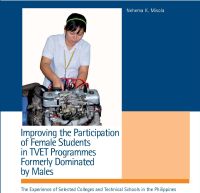
The UNESCO-UNEVOC International Centre: Who We Are | What We Do | Working With Us | Get in Touch
The UNEVOC Network: Learn About the Network | UNEVOC Network Directory
For Members: UNEVOC Centre Dashboard
Thematic Areas: Inclusion and Youth | Digital Transformation | Private Sector Engagement | SDGs and Greening TVET
Our Key Programmes & Projects: BILT: Bridging Innovation and Learning in TVET | Building TVET resilience | TVET Leadership Programme | WYSD: World Youth Skills Day
Past Activities: COVID-19 response | i-hubs project | TVET Global Forums | Virtual Conferences | YEM Knowledge Portal
Our Services & Resources: Publications | TVET Forum | TVET Country Profiles | TVETipedia Glossary | Innovative and Promising Practices | Toolkits for TVET Providers | Entrepreneurial Learning Guide
Events: Major TVET Events | UNEVOC Network News
New Case Study
 The marginalization of women leads to many countries losing out on the possibility of utilizing the potential of this human capital. This human loss for the local community, but also for national development and growth, puts increasing pressure on governments to improve gender equality, especially with regard to women’s enrolment in male-dominated technical and vocational education and training (TVET) courses. In addition, the emancipation of girls and women through TVET, with a view to allowing them to enter the labour market and thus to contribute significantly to their family’s income, is a key contribution to poverty alleviation.
The marginalization of women leads to many countries losing out on the possibility of utilizing the potential of this human capital. This human loss for the local community, but also for national development and growth, puts increasing pressure on governments to improve gender equality, especially with regard to women’s enrolment in male-dominated technical and vocational education and training (TVET) courses. In addition, the emancipation of girls and women through TVET, with a view to allowing them to enter the labour market and thus to contribute significantly to their family’s income, is a key contribution to poverty alleviation.
This case study, the 3rd volume in the Series of Case Studies of Technical and Vocational Education and Training in Selected Countries, analyses and describes policies and practices that obtain in selected institutions in the Visayas Region of the Philippines to improve the participation of females in male-dominated TVET courses and to enhance the role of women in national development. Often, efforts to put in place appropriate policies and suitable support measures come to grief, or take inordinate long time to effect, for lack of the availability of easy-to-use examples, case studies, and other tools. The present case study contributes to the pool of resources of what works in TVET with reference to increasing the enrolment of female students in formerly male-dominated fields. It shows a mixture of changes that were implemented, ranging from policies, to physical infrastructure, to funding, to support services such as guidance and counselling and to learning environments.
The Series of Case Studies of Technical and Vocational Education and Training in Selected Countries provide in-depth information on issues of specific importance in the TVET systems of selected countries and regions. Through the case studies, it is intended to build a pool of resources and tools of what works as part of the UNESCO-UNEVOC International Centre’s clearinghouse.
Author: Nehema K. Misola
Language: English
Published by: UNESCO-UNEVOC
Year of publication: 2010
Number of pages: 36
ISBN 978-92-95071-12-4